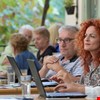
/ Mediterranean
The secret to effective stakeholder engagement for applied Nexus solutions
Why is stakeholder engagement a crucial ingredient for the success of Horizon projects, and in particular those that focus on the Water-Energy-Food Nexus? What is the secret to ‘getting it right’? And what are some common myths and pitfalls to be avoided? We hear from ICatalist, a consultancy specialized in climate change adaptation and sustainability,and REXUS partner leading the Work Package on Learning and Action Alliances. Interviewed by Global Water Partnership – Mediterranean, REXUS communication and dissemination leader.
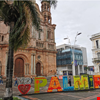
/ Mediterranean
'It starts with engaging stakeholders': Rexus pilots advance by framing Nexus challenges
GWP-Med is leading the communication and dissemination component of the Horizon 2020 REXUS project, which is applying innovative engagement and modeling tools to help the shift from Water-Energy-Food Nexus Thinking to Nexus Doing.
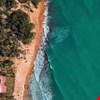
/ Mediterranean
World Wetlands Day: farmers and young entrepreneurs from Tunisia acting for the conservation of their local wetland
On World Wetlands Day 2022, GWP-Med presents the stories of farmers and young entrepreneurs who live close to Ghar El Melh, one of Tunisia’s most precious wetlands. How and why did they decide to act to save this natural treasure? Was their effort worth it?
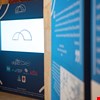
/ Mediterranean
Webinar: Lessons for the Mediterranean from Non-Conventional Water Resources applications in Malta
What has been the secret of successful NCWR applications in Malta and what is the potential for replication across the Mediterranean? Join our upcoming webinars on lessons learned from the experience of the Alter Aqua programme in the Maltese islands.
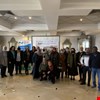
/ Mediterranean
Capacity building trainings for the AIP WACDEP-G multi-stakeholder group on gender equality and gender transformative planning for climate- resilient water investments in Tunisia
Through an inclusive multi-stakeholder approach, the AIP WACDEP-G programme aims to actively engage public sector policy and decision makers in its implementation. Targeted capacity building is a core element to ensure active engagement and a sense of ownership by stakeholders.

/ Mediterranean
Coming together for sustainable development in the Drin River Basin; Five key lessons from Southeastern Europe for successful transboundary cooperation
Covering a geographical area of 20,361 km2 connecting 5 countries and 5 water bodies, the Drin Basin in Southeast Europe sustains unique ecosystems and endemic biodiversity, while supporting the economic activity of over 1.6 million people who call it home. However, four transboundary problems - deterioration of water quality, variability of hydrological regime, biodiversity degradation and disturbance of the natural sediment transport regime - are threatening the basin’s health with a direct impact on both the environment and livelihoods.
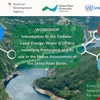
Workshop-Introduction to the Climate-Land-Energy-Water (CLEWs) modelling framework and its use in the Nexus Assessment of the Drina River Basin
A two-day workshop on the Climate-Land-Energy-Water (CLEWs) modelling framework and its use in the Nexus Assessment of the Drina River Basin took place on 8,9 July 2021. The purpose of the workshop was to familiarise participants with the Climate, Land, Energy and Water systems (CLEWs) nexus methodology, used to quantitatively assess the energy-water interlinkages within the Nexus assessment of the Drina River Basin. By providing an overview of general concepts, tools used and hands-on experience on model building, the workshop opened the box of the modelling analysis to the audience and laid the ground for local uptake of the model infrastructure.
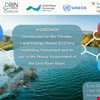
Introduction to the Climate-Land-Energy-Water (CLEWs) modelling framework and its use in the Nexus Assessment of the Drin River Basin
The Climate-Land-Energy-Water (CLEWs) framework is a modelling tool for quantitative analysis of the Nexus between the biophysical systems of climate, land (including agriculture), energy and water.
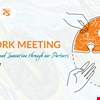
/ Mediterranean
GWP-Med’s success stories presented at the Thematic Sessions of GWP’s 2021 Network Meeting of Partners
The GWP 2021 Network Meeting of Partners took place online on 1 & 2 December under the Theme “Leading Change and Innovation through our Partners”. GWP-Med was actively involved, presenting examples of success stories from its work around the Mediterranean in several Breakout Sessions.